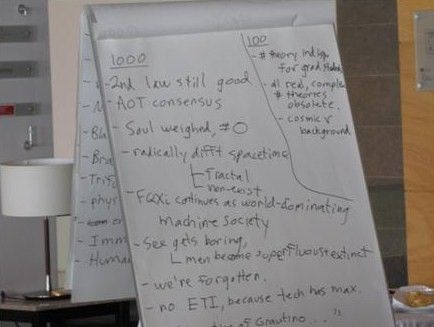Day three of the FQXi Azores conference (I'll catch you up on day two later).
I was reminded of the tale of the first "absent-minded professor," the ancient philosopher Thales of Miletus. Plato apparently described how Thales was walking along at night gazing at the sky and pondering the workings of the universe when he fell into a ditch. A young girl nearby commented, "How do you expect to understand what is going on up in the sky if you do not even see what is at your feet?"

The reason that story came to mind was that yesterday the conference delegates were split into groups and let loose on the volcanic São Miguel Island to ponder the future of physics--having first been warned by the tour guide not to fall into any holes. The warning was sincere as some of us visited an area of geothermal activity riddled with perilously large holes in the ground filled with bubbling water. (One of the local culinary specialities that we sampled was the "Cozido das Furnas" ("Furnas boiled meal")--basically food placed in a pot and cooked under soil in one of these bubbling water holes for 6 hours. The photo, courtesy of www.virtualtourist.com, shows one of the cooking pots being lifted from the ground.)
So, was endangering tens of prominent cosmologists and physicists worth it? Well, yes. They all managed to get back to the conference venue safely and the scenic surroundings inspired them to come up with some interesting predictions--some more serious than others--for the state of our understanding of the universe in both 10 years time, and in1000 years .
Some of the possibilities thrown around for 10 - 100 years in the future:
*Even if a functioning quantum computer hasn't been built in 10 years time, we could at least pin down what they are capable of doing in principle. Giovanni Amelino-Camelia's group also suggested that a working quantum computer could ultimately expose a _failure_ in our current understanding of quantum mechanics (giving a 10 percent chance this could happen).
*Some said that Moore's Law would fail within ten years. (Others saw it holding for another 100 years.).
*Garrett Lisi's group believed that something contending to be the Higgs would be found at the LHC.
*Xiao Gang Wen's group suggested that we may find laws of physics based entirely on real numbers. Maulik Parikh's group saw number theory becoming of primary importance to physicists.
*Laura Mersini-Houghton's group were pretty optimistic about the number of issues that could be solved--or at least better understood--within this timeframe. They predicted that dark matter would have been directly detected, that the character of dark energy would be better understood and that we should know whether time is a truly fundamental property or if it emerges from something else. They also argued that within the next decade the multiverse framework would become mainstream, with a new field dedicated to looking for observational evidence of other universes.
*On the slightly pessimistic side, Glenn Starkman's group suggested that the Planck satellite _won't_ tell us anything new or useful about inflation.
*On the extremely pessimistic side both Garrett Lisi's group and Dmitry Budker's group predicted that all other problems/achievements could well be rendered moot by some catastrophic form of rapid climate change.
When they moved onto scenarios for 1000 years in the future things got (understandably) more speculative still. (Giovanni Amelino Camelia made a cheeky comment that in coming up with these scenarios he felt as though he was coming up with covers for New Scientist magazine: "Observation of pocket universe gravitino burst!" Having worked at NS, I am choosing to take that as a compliment to the magazine's foresight and imagination. Ahem.)

Ideas for 1000 years included:
*A couple of teams suggested that artificial (quantum computer) intelligences would have been created. (By contrast, Xiao-Gang Wen's group suggested that by then quantum mechanics would have been proved wrong, and so the quest for a quantum computer would finally no longer be an issue.)
*Fotini Markopoulou's group broke the AI scenario down further coming up with 4 possible outcomes of building such an AI: (a) The AI would be smart enough to come up with a theory of quantum gravity and help us. (b) The AI would just kill us. (c) The AI would tell us the solution to the problem of quantum gravity--and then kill us. (d) The AI would keep us as pets. (T.P. Singh dubbed these scenarios as the "misanthropic principle.")
*A few groups suggested that we would have been contacted by aliens. (Scott Aaronson added that intelligent aliens could help us build smart AI, while smart AI could help us search for ET.)
*Giovanni Amelino Camelia's group believed that by then we should be able to perform interferometry with black holes. Paul Davies imagined interferometry with brains.
*A few groups predicted we'd be able to upload our brains into a computer--an idea we've talked about before--though it was unclear what that would mean for our sense of identity, and whether that would mean we would become immortal.
*Our understanding of consciousness was a point of contention--is this something that physics could ever address? Would computers be able to simulate consciousness (and if so, would they _experience_ consciousness as we know it?)
*Wormhole time travel agencies would be all the rage--or the discovery of large extra dimensions could facilitate time travel, or help us check out other universes in the multiverse and finally report back on their existence (or not).
*We could weigh our souls...
*We could realize we're just a simulation.
*Pauline Davies joked that sex would become obsolete because it would be seen as boring, messy, and unneeded. Others (less jokingly) added that the same would be true for string theory.
*Finally the consensus was that the 3009 FQXi conference would meet on an exoplanet and be peopled by machines.
*But the most outlandish suggestion? That within 1000 years, Britain would give up the £ and join the European currency.
Any other ideas out there for the state of the world(/universe/multiverse) in 10 years, 100 years and 1000 years?
Everybody's now rating how important, interesting, and worthy of debate they find these scenarios. I will update you on the result.